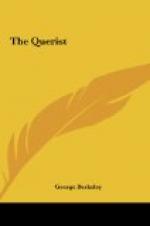156. Qu. Whether, if we do not reap the benefits that may be made of our country and government, want of will in the lower people, or want of wit in the upper, be most in fault?
157. Qu. What sea-ports or foreign trade have the Swisses; and yet how warm are those people, and how well provided?
158. Qu. Whether there may not be found a people who so contrive as to be impoverished by their trade? And whether we are not that people?
159. Qu. Whether it would not be better for this island, if all our fine folk of both sexes were shipped off, to remain in foreign countries, rather than that they should spend their estates at home in foreign luxury, and spread the contagion thereof through their native land?
160. Qu. Whether our gentry understand or have a notion of magnificence, and whether for want thereof they do not affect very wretched distinctions?
161. Qu. Whether there be not an art or skill in governing human pride, so as to render it subservient to the pubic aim?
162. Qu. Whether the great and general aim of the public should not be to employ the people?
163. Qu. What right an eldest son hath to the worst education?
164. Qu. Whether men’s counsels are not the result of their knowledge and their principles?
165. Qu. Whether an assembly of freethinkers, petit maitres, and smart Fellows would not make an admirable Senate?
166. Qu. Whether there be not labour of the brains as well as of the hands, and whether the former is beneath a gentleman?
167. Qu. Whether the public be more interested to protect the property acquired by mere birth than that which is the Mediate fruit of learning and vertue?
168. Qu. Whether it would not be a poor and ill-judged project to attempt to promote the good of the community, by invading the rights of one part thereof, or of one particular order of men?
169. Qu. Whether the public happiness be not proposed by the legislature, and whether such happiness doth not contain that of the individuals?
170. Qu. Whether, therefore, a legislator should be content with a vulgar share of knowledge? Whether he should not be a person of reflexion and thought, who hath made it his study to understand the true nature and interest of mankind, how to guide men’s humours and passions, how to incite their active powers, how to make their several talents co-operate to the mutual benefit of each other, and the general good of the whole?
171. Qu. Whether it doth not follow that above all things a gentleman’s care should be to keep his own faculties sound and entire?
172. Qu. Whether the natural phlegm of this island needs any additional stupefier?
173. Qu. Whether all spirituous liquors are not in truth opiates?
174. Qu. Whether our men of business are not generally very grave by fifty?




